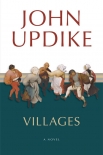Villages by John Updike (best summer reads of all time .TXT) 📗

- Author: John Updike
Book online «Villages by John Updike (best summer reads of all time .TXT) 📗». Author John Updike
When, that evening, with the four children at last in their beds, he began to confess, she cut him off. “I know. Jock came over this afternoon and told me. Well, do you want a divorce?”
“No.” The softball game with the two older children, taking their determined stances at the imaginary plate, imitating the gestures of ballplayers on television, cocking the bat so it pointed straight up at the fleecy, tossing April sky, and then so touchingly striking out, had erased his recurrent dream, a kind of fever dream, of a life with Faye.
“Well, you better tell them that, before they go ahead and get one.”
Of the subsequent agitated palavers—the four of them at one grim, eventually drunken conference in their house, where he had more than once been an illicit guest, and then in scattered tête-à-têtes, as the increasingly public aftermath unfolded, between Jock and Phyllis, Jock and him, Phyllis and him, Faye and Phyllis, every pairing except the one it was all about—Owen had the defective memory of the severely embarrassed. He didn’t want to remember it. Moments continued to stick in his mind as contexts melted into forgetfulness: Jock asking him, across the booth in the old-fashioned aluminum roadside diner toward Lower Falls, “Did she have climaxes with you?”
Owen took the question as rude aggression, some kind of cuckold’s gibe, and refused to answer it, but in hindsight imagined a watery earnestness in Jock’s eyes, their strained, pickled whites. What would the honest answer have been? It was too embarrassing—Owen wasn’t sure. Faye had been so loving, so smiling, and had bestowed upon their trysts (pathetically rare, in retrospect) such a glad aura of excitement and relief, that he had assumed so without any more evidence than his own easily obtained satisfaction. She would lie under him with her eyes closed, a little pulse in the lids, and when she opened them give him her gorgeous big grin and speak in a higher, shyer voice than usual. Phyllis, though he thought of her as cool and not often interested, gave clearer signs of orgasm. But, he reasoned, on this matter where so much of his education was yet to come, female sexuality must have many styles; he pictured it as a kind of harp whose strings, always faintly murmuring, were of widely different lengths and thicknesses. Yet the notion that Faye had been faking climaxes, or unprotestingly feigning contentment without them—that she had been, beneath her flashiness and show of ardor, frigid—wounded his sense of her; she had been deceiving him.
Phyllis, too, in the long aftermath, contrived to diminish his image of Faye and reconcile him to his loss. “Didn’t you kids,” she asked him, “ever seriously discuss divorce and remarriage?”
He could not exactly remember. He had more than once said how lovely it would be if she were his wife, but this wasn’t a proposal, was it? It was a dream, an alternate universe.
“It seems obvious,” Phyllis went on mildly, considering the problem like one in topology, “that she wanted it. Jock takes good care of her financially, but as a husband I think he’s exhausted her capacity to romanticize him.”
“Did she romanticize me?” He had felt, merely, that she had assigned him his true value. Their whole affair, from the first event in the woods by Whitefield’s Rock, had taken place under the sign of truth—fresh truth, fresh seeing. A smeared window had been ammoniated and wiped clean. As he plodded through one of E-O’s contracted applications programs for an insurance company’s records and logarithmized risk margins or a Danbury hat factory’s cost accounting, payroll, and stock control, he was aware of a lessened ability to link and combine logic chains, a fuzziness in his neurons brought on, perhaps, by their saturation in memories and anticipations of sex with Faye. But he was confident that eventually a new mental strength would result from this dip into sexual adventure. His marriage to Phyllis, when new—just lying beside her sleeping body, in unconscious partnership with her breathing and her dreams—had brought on brainstorms of which DigitEyes was the final, precocious product. After a few years, however, many rival such programs entered the market, while his vision of a graphic computer-user interface remained frustrated by the limits of the hardware, and the hardware’s high cost.
High cost—what it came down to, perhaps, was that Faye had seemed too expensive for him; he could time-share her but not own her.
“Of course, it’s what people do,” Phyllis told him, wearily, even tenderly, out of that ambient Cantabrigian wisdom she had absorbed as a girl. “Romanticize. Otherwise it all seems gross. Fucking,” she clarified. There had been a time when she wouldn’t have used the word, but the counterculture had changed that. Phyllis liked the faux-pauvre costumes of the young, their lack of makeup, their attachment to radical causes, their theoretical bent and belief in contentious discourse; it felt like home to her, something she had been part of before E-O Data had brought her to middlebrow Middle Falls. “Not that you needed much romanticizing; you’re an attractive man, Owen.”
“Now you tell me.”
“I told you from the start, the best I could. I can’t gush the way Faye does. Attractive, and she





Comments (0)